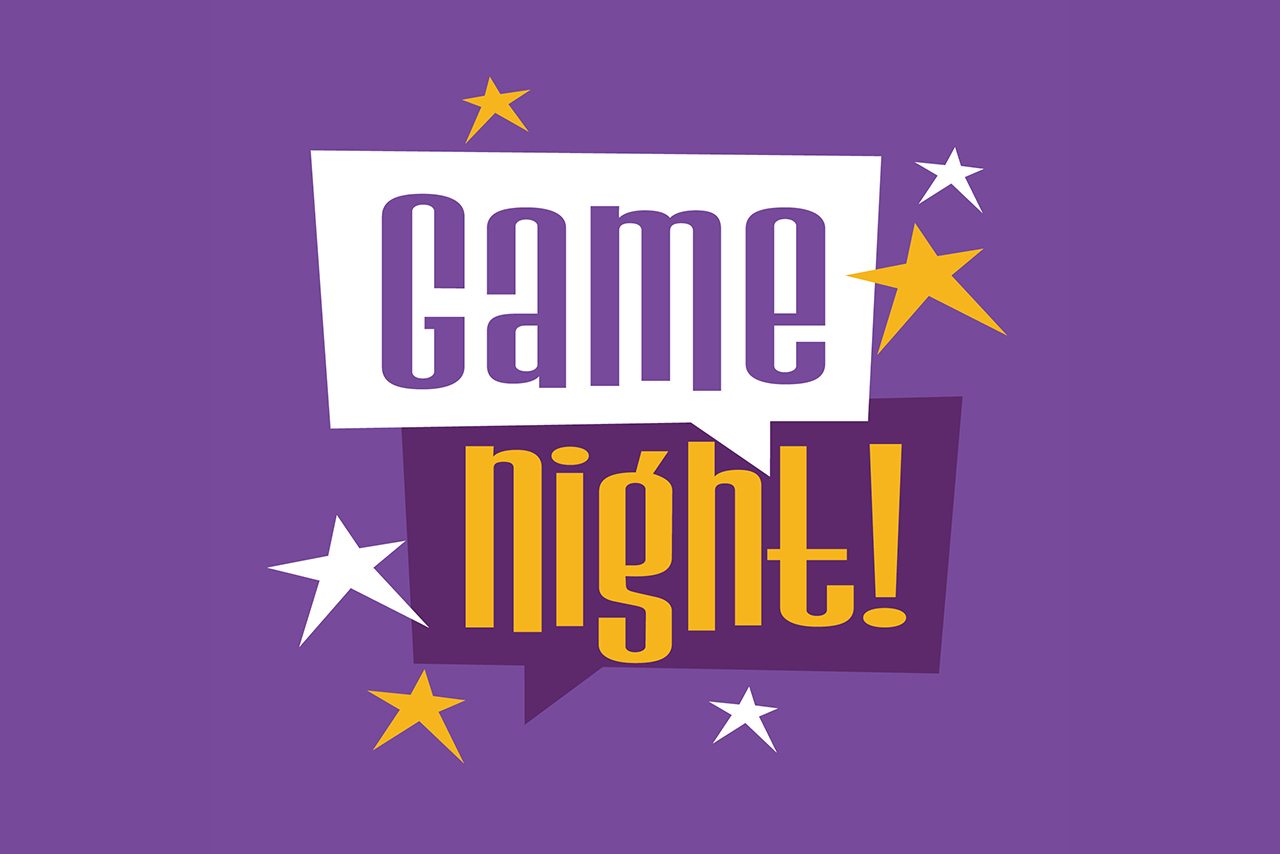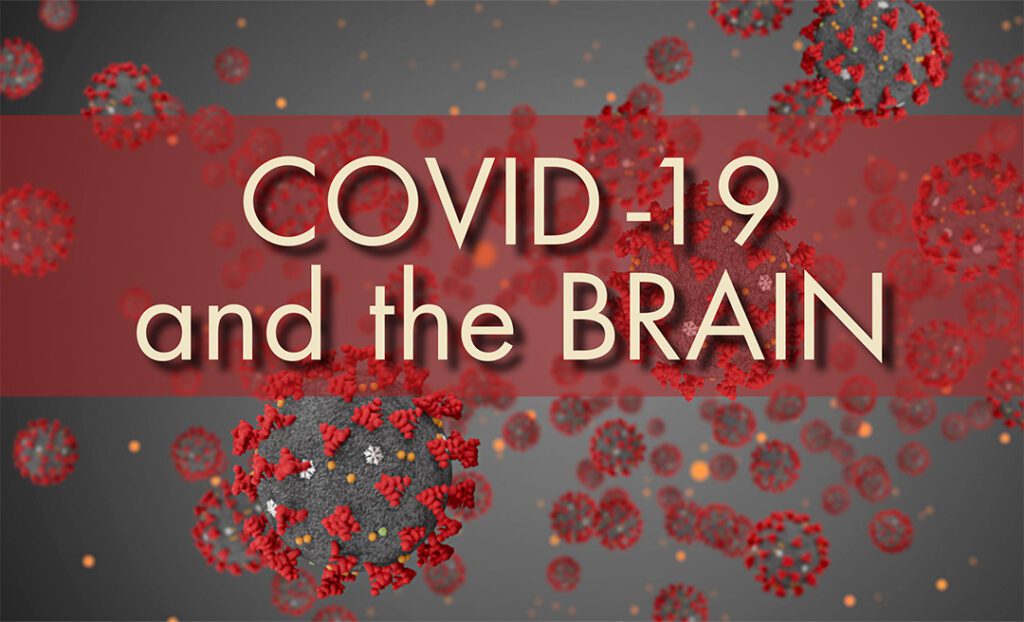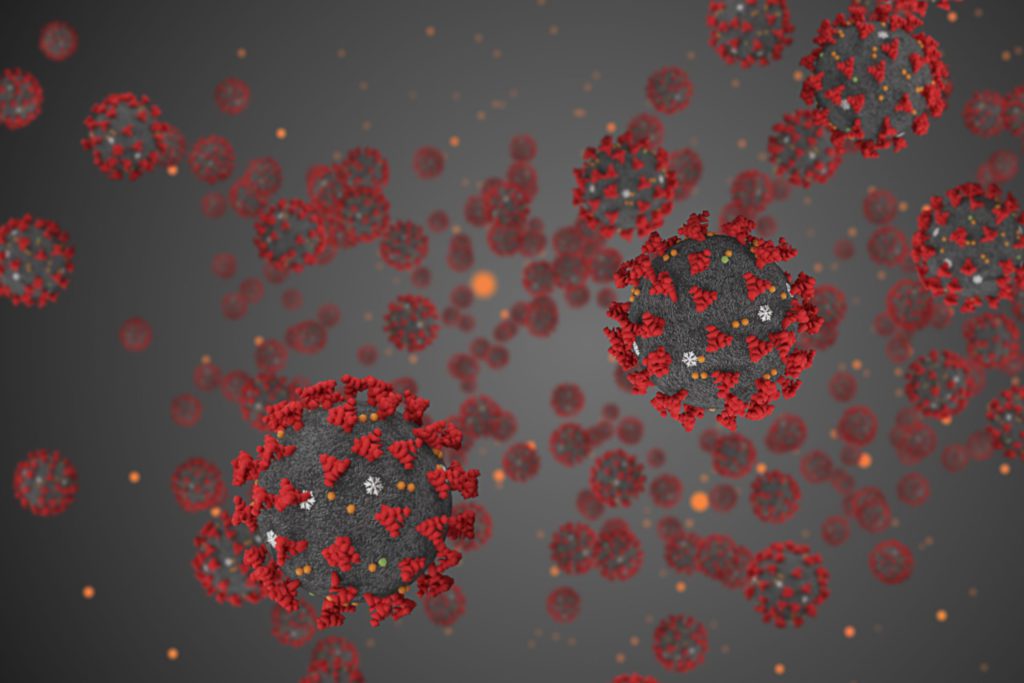COVID 19 and the Brain
Support • Answers • Information
Supporting Arizona’s Brain Health & Wellness
COVID-19 has been part of our vocabulary, upending our world for over a year. We mourn those who we have lost to the virus while strategizing how to serve the unique needs of those who have survived. Every day, we are unraveling the mystery of COVID-19 and discovering more about the long-term neurological side-effects for some who survive the virus. Join us in our important work in 2021 as we explore the social, physical, and neurological challenges COVID-19 is presenting us. If you have had COVID-19 and are experiencing lingering symptoms, from loss of smell to balance issues and sleep disturbances, please reach out to our team today. There is hope and there is help available.
— Carrie Collins, MPA, Executive Director
COVID 19 and the Brain
Support • Answers • Information
Supporting Arizona’s Brain Health & Wellness
COVID-19 has been part of our vocabulary, upending our world for over a year. We mourn those who we have lost to the virus while strategizing how to serve the unique needs of those who have survived. Every day, we are unraveling the mystery of COVID-19 and discovering more about the long-term neurological side-effects for some who survive the virus. Join us in our important work in 2021 as we explore the social, physical, and neurological challenges COVID-19 is presenting us. If you have had COVID-19 and are experiencing lingering symptoms, from loss of smell to balance issues and sleep disturbances, please reach out to our team today. There is hope and there is help available.
— Carrie Collins, MPA, Executive Director
LIVE COMMUNITY EDUCATIONAL EVENTS
F.A.Q.’s About COVID-19 and the Brain
About Brain Injury and COVID-19
Can COVID-19 negatively impact the brain?
Doctors in Chicago found that more than 40% of COVID-19 patients showed neurologic manifestations at the outset; more than 30% of those had impaired cognition[1]. The CDC reported that 35% of symptomatic adults who had tested positive for COVID-19 had not returned to their usual state of health up to three weeks later.
A potentially large number of COVID-19 survivors are still experiencing neurological and other symptoms many months after their infection had cleared. These still-suffering survivors have come to be called COVID-19 “Long-Haulers.”
[1] https://onlinelibrary.wiley.com/doi/full/10.1002/acn3.51210
Which neurological symptoms can COVID-19 cause?
People who have been infected with COVID-19 may experience loss of smell and taste, headaches, fatigue, dizziness, memory loss, confusion, difficulty focusing, slower processing speeds, and “brain fog.” For some people, these symptoms may clear up with the virus. For others, they may remain indefinitely.
More serious effects have included loss of consciousness, strokes, seizures, encephalopathy, encephalitis, and Guillain-Barre syndrome.
Why is the loss of taste and smell significant?
While the loss of taste (hypogeusia) and smell (anosmia) may seem like mild and even humorous symptoms, we must be aware of what it may suggest. Some scientists hypothesize that this is caused by the virus inhibiting olfactory neurons. Others, however, believe it is only olfactory cells in the upper nasal cavity that are being affected.
Can COVID-19 cause a stroke?
While COVID-19 is considered a lung infection, it has also been found to cause blood clots, which can lead to severe stroke. This has been experienced by people as young as 30, and by those experiencing few or no other COVID symptoms.
Can COVID-19 cause seizures or epilepsy?
Cytokines are substances that are released by the immune system and affect other cells. In cases of infection, the immune system releases pro-inflammatory cytokines. These are meant to help fight off infection; however, high levels of cytokines can cause a breakdown in the blood-brain barrier, which normally protects our brain from viruses and bacteria. This collapse can result in seizure or epilepsy. Seizures can cause neurovascular decoupling, which we will discuss below.
Can COVID-19 cause psychosis?
In rare cases, people with no history of mental illness have developed psychosis weeks after contracting COVID-19, even if their other symptoms had been mild. One theory is that their immune system may remain engaged due to small amounts of lingering virus. Another is that some of the neurotoxins released by the immune system can pass through the blood-brain barrier and cause damage to the brain.
Can COVID-19 increase risk of developing Alzheimer’s disease?
Possibly. Autopsies of the brains of COVID-19 patients revealed leakage of small blood vessels in different areas of the brain, as if the patient had suffered mini-strokes. Brain inflammation and mini-strokes may place a person at increased risk of developing Alzheimer’s disease and other dementias.
One study found that the gene ApoE4, which increases the risk for Alzheimer’s disease, can also increase risk of catching COVID-19 and of having a higher severity of infection.
How else might COVID-19 affect the brain?
We don’t know yet if COVID-19 can directly infect brain cells. However, there are many indirect ways that COVID-19 can impact the brain.
Researchers who examined the brains of people who died after contracting COVID-19 determined that many neurological symptoms are likely due to the body’s immune response. Widespread inflammation that the body uses to try to fight the virus (and the associated blood vessel injury) is what may be harming the brain, rather than the brain tissue itself being infected with the virus. Inflammation of the brain is called encephalitis.
Swelling and inflammation can interfere with neurovascular coupling (NVC), which is the connection between brain cells and the blood vessels that supply them. This neurovascular decoupling may be the main cause of lingering symptoms after the virus is gone.
Hypoxic injury, which is caused by a lack of oxygen, has also been found in the brains of those who died from COVID-19. When a virus replicates and proliferates in the lungs, it causes inflammation and issues with gas exchange, which can develop into hypoxia in the central nervous system.
Cytokine storms can occur when the body’s immune system overreacts, and the chemicals meant to fight infection (cytokines) end up causing harm by latching onto and killing healthy brain cells. This can lead to symptoms similar to concussion.
As with any threat, COVID-19 can activate our sympathetic nervous system (flight-or-flight response). Even after the virus is gone, our overactivated nervous system may not relax. This can result in headaches, blood pressure issues, heart palpitations, gastrointestinal issues, light and noise sensitivity, and more.
COVID-19 may cause coagulopathy – the blood’s clotting ability is impaired. One study revealed that COVID-19-related coagulopathy can lead to cerebral venous thrombosis. This is when a blood clot forms in the brain’s venous sinuses, prevents blood from draining out of the brain, and causes blood cells to break and leak blood into the brain tissues, forming a hemorrhage.
Does a brain injury increase a person’s odds of catching COVID-19?
By itself, no. However, having a brain injury may lead to circumstances that do put a person at higher risk, such as living in a long-term care facility.
Can COVID-19 worsen brain injury symptoms?
Yes, COVID-19 can directly or indirectly induce or worsen an acquired brain injury. Much of the damage from a traumatic brain injury is caused by the brain’s inflammatory response. A COVID-19 infection can also cause inflammation in the brain, which can then exacerbate a brain injury*. COVID-19 also impacts neural function and supply of blood and oxygen to neural tissue**.
All of the effects outlined in the above sections can disrupt a person’s recovery from a brain injury and intensify their symptoms.
What’s more, individuals taking medications, such as survivors of traumatic brain injury, may be more at-risk, as their liver is put under more strain to process additional medications.
Can I stop social distancing and wearing a mask after I get the vaccine?
No, please continue to take precautions until public health experts advise otherwise. While the vaccines were granted Emergency Use Authorization by the FDA for their ability to prevent illness and death, we do not know yet if the vaccines also prevent an asymptomatic person from spreading the virus to others. Please continue to social distance, mask up, and wash your hands frequently to help protect others who may not be vaccinated.
About Vaccination
When can I get the COVID-19 vaccine?
On March 22, Arizona expanded Covid-19 vaccination eligibility to everyone 16 and older. So if you are over 16 years of age, you can schedule your vaccination now!
Where can I get the vaccine?
Information about all vaccination sites across the state can be found at www.azhealth.gov/findvaccine. Those without computer access or needing extra help registering can call 1-844-542-8201 for assistance. To make an appointment for a relative, you can use the patient portal at https://podvaccine.azdhs.gov.
How much does the vaccine cost?
The vaccine is free for everyone. You do not need to have insurance to receive the COVID-19 vaccine, however the provider may ask for your insurance card if you do.
Should I get the vaccine if I have already recovered from COVID-19?
Yes. Recovering from the COVID-19 virus does not make you immune to future infection.
Will the vaccine give me the virus?
No. There is no virus – dead or alive – in the COVID-19 vaccines. The vaccine simply teaches your body how to respond if you were to be exposed in the future.
Will I get sick or die because of the vaccine?
Some people do experience symptoms after their first or second dose of the vaccine, however these are caused by your immune system response, not by exposure to any virus. The CDC estimates that 2 – 5 out of every million people who receive the vaccine may have a severe allergic reaction. That is why, when you go to after you get your vaccine, you will be asked to wait for 15 minutes after, to be sure you do not have a serious reaction. So far, the CDC has not identified a single death caused by the vaccine.
Will the vaccine change my DNA?
No. The mRNA vaccine contains “messenger” RNA, which teaches your body how to fight the virus if you are ever exposed. Your DNA is not involved in this process whatsoever.
Was the vaccine rushed out without enough testing?
While it may appear that the vaccine came out relatively quickly, this is due to experts in the entire biotech industry shifting their focus onto the COVID-19 pandemic and making great advancements in genetics and mRNA technology in record time. No shortcuts were taken. Clinical trials ensured that the vaccines were safe and effective. The vaccine is considered to be 94.1% (Moderna) or 95% (Pfizer) effective in providing immunity.
Should I get the vaccine if I have had a brain injury?
Yes! The Brain Injury Association of America has encouraged all individuals with brain injury to get vaccinated. This will help avoid the inflammatory issues associated with COVID-19, as shown above. Anyone with a brain injury is particularly vulnerable to diseases like influenza and COVID-19, due to the increased risk of complications. There is no evidence to suggest that receiving the vaccine will worsen symptoms of TBI but catching the virus can.
There is a very small chance that the vaccine can cause demyelination. You may want to talk to your provider if demyelination is a concern with your particular brain injury. However, the vaccine has NOT been declared unsafe for individuals with other conditions that affect myelin (multiple sclerosis, central pontine myelinolysis, transverse myelitis, Guillgin-Barre syndrome). For most people, the risks of COVID-19’s effects on the brain far outweigh the risk of demyelination.
When should a person NOT get the vaccine?
The CDC advises people not to get the COVID-19 vaccine if they have experienced any of the following, unless they have been evaluated by an allergist-immunologist who determines that they can safely receive the vaccine.
- Severe allergic reaction (e.g., anaphylaxis) after a previous dose of an mRNA COVID-19 vaccine or any of its components
- Immediate allergic reaction of any severity to a previous dose of an mRNA COVID-19 vaccine or any of its components (including polyethylene glycol [PEG])
- Immediate allergic reaction of any severity to polysorbate (due to potential cross-reactive hypersensitivity with the vaccine ingredient PEG)
If you have ever had an immediate allergic reaction to any other vaccine or injectable therapy (i.e., intramuscular, intravenous, or subcutaneous vaccines or therapies [excluding subcutaneous immunotherapy for allergies, i.e. “allergy shots”] not related to a component of mRNA COVID-19 vaccines or polysorbate), the COVID-19 vaccine may not be right for you. Please talk to your provider or an allergist-immunologist about the risks of exposure to COVID-19 versus the possibility of experiencing a severe allergic reaction.
Get Help! If you have had COVID-19 and have questions about your brain health and wellness or are experiencing lingering symptoms, please reach out for confidential free assistance from a Certified Brain Injury Specialist.
- Call our statewide neuro info-line at 888-500-9165
- Fill out our electronic referral form (below)
Articles of Interest
Brain Injury Alliance of Arizona Providing Critical Support for Survivors of Long-COVID
It is estimated that somewhere between 10-35% of those who have had COVID-19 fall into a category known as Long-COVID survivors. Long-COVID survivors may fall into gaps in health care and community services, which can be disheartening at best, and life-threatening at worst.
Lessons Learned From the Edge of Life: Part 3
This is the third and final of a three-part series about Bob Millsap’s personal experience surviving COVID-19, beating the odds, and his ongoing road to recovery.
Lessons Learned From the Edge of Life: Part 2
This is the second in a three-part series about Bob Millsap’s personal experience surviving COVID-19, beating the odds, and his ongoing road to recovery. Tune in next week for Part III.
Lessons Learned From the Edge of Life: Part 1
This is the first in a three-part series about Bob Millsap’s personal experience surviving COVID-19, beating the odds, and his ongoing road to recovery. Tune in next week for Part II.
The Stuff That Dreams Are Made Of
The pandemic may have made you exhausted and listless, but that’s only during your waking hours. Sleep has brought upon us a whole new world.
More Communication Among Athletes, Coaches, and Parents During Time of COVID
Brain Injury Alliance encourages extra communication around head injuries between athletes, coaches, and parents during time of COVID
The Real Reason 2020 Wasn’t So Memorable
Your memory used to be like a steel trap, but for the past few months, it seems to have magically disappeared. You can’t remember easy things, like where you left your keys, appointments, even your kids’ names. Don’t worry, you’re (probably) not losing it. It’s just another reason to hate 2020.
Parenting And Brain Injury During A Pandemic
Even in the best of times, parenting is as tough as it is rewarding. During a pandemic, however, all rules go out the window — Or do they?
Telemedicine a Welcome “House Call” for Survivors of Brain Injury
In several short months, the playing field has changed, thanks to telemedicine. In fact, health care analysts estimate the pandemic and ensuing stay-at-home orders accelerated the widespread implementation of telemedicine by at least a decade.
Tips for Surviving the Summer of COVID with a Brain Injury
The COVID-19 pandemic and quarantine have created challenges for people across the world. This is, perhaps, especially true for traumatic brain injury (TBI) survivors and their caregivers who are already dealing with the physical, mental, and emotional consequences of brain injury
Video Resources
COVID-19: Coping with Stress — Dr. Dara Rampersad
How family members of First Responders and Essential Employees can cope with the stress of COVID-19 emergency work conditions
COVID-19: Caring for the Body & Mind — Julie Rake, MSPAS-PAC
Caring for the Body & Mind as the COVID-19 Pandemic Ensues
Staying Connected & Maintaining Positivity in Challenging Times — Steve Gamlin
2-part presentation: Steve is joining us for the second time as a Rays of Hope speaker, bringing messages to encourage you to keep pressing on and try to keep smiling.
Brain Injury Association of Arizona
5025 E. Washington St, Ste 106
Phoenix, Arizona 85034
QCO CODE: 22360
EIN 94-2937165
CALL
(602) 508-8024
HELP LINE
(888) 500-9165
Fax (602) 508-8285
FOLLOW US
contact us
privacy policy
terms & conditions


















